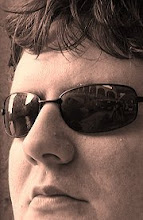Summary - I read Daniel Dennett's 1978 classic "Where Am I?" and found it very sub-par and almost shockingly uninteresting. I reflect on whether I'm missing something, or if the article is just plain bad, or perhaps if it simply tells me nothing new and I'm experiencing boredom at reading something below my current level of expertise.
I read a lot of philosophy and it happens that I come across a sub-par or uninteresting or just plain "meh" article. Often those are helpful, for they help me pick out my areas of interest and reflect on why they interest me more. At times, though, the guilty paper is right up my alley and I just want to shake the author and yell at him/her. So imagine my surprise when I had this reaction with a Daniel Dennett piece. Okay, so Dennett isn't exactly a philosopher, though he's pretty darn close and he's made significant contributions to philosophy of mind. And phil.mind isn't exactly my field, though I do read up on occasion about the "hard question" and reductive vs. nonreductive materialism. Still, I've always held Dennett in high esteem, surely in no small part because of his contributions to the evolution-creationism debate and his militant atheism (not that I endorse militant atheism generally, but he's a pretty damn cool guy).
The guilty paper is his classic 1978 essay "Where Am I?", in which he proposed a meta-physical variant of Hilary Putnam's brain-in-a-vat mindfuck (yes, that's a technical term).
The paper is written like a fictional first-person account, which makes it fun to read but dispersive: it could have taken him 3 pages to say what he did in 10. Summary is as follows......
- Dennett's brain, named Yorick, is removed from his body ("Hamlet"), kept alive in a vat, and cabled in to a radio controller.
- High-tech, radio-controlled microchips are also implanted in Hamlet's skull, so that Yorick can remote-control Hamlet.
- Yorick is in a vat in a lab in Houston while Hamlet travels to Tulsa to perform a dangerous mission for the government.
- Hamlet "dies" in Tulsa.
- Yorick is copied to a computer software, Hubert, and the two brains are sync'ed.
- Dennett wakes up with a new body, Fortinbras, which is connected to BOTH Yorick and Hubert.
- Dennett can switch between the two at the touch of a button, but he never knows which brain is in use and which one is the spare.
- Eventually, the spare brain falls out of sync.
- When Dennett hits the switch, the out-of-sync brain "tells" of how nasty it felt to be out of sync with both Fortinbras and the other brain, "as if being possessed."
- End of story.
Damn cool story, but what does it mean? First a few important details. Before the spare brain is made, is Dennett in Tulsa or in Houston? He guesses he is in fact in both places, for his "I" is in his brain in Houston but his spatial point of view is definitely located in Tulsa. This he takes to mean that our perception of selfhood is more heavily influenced by our external inputs than by reason alone. Even if we're strict physicalists and think that the mind "just is" the brain, it's still nearly impossible for us to imagine ourselves as disembodied brains-in-vats. Point of view still takes over.
But when Hamlet dies in Tulsa, Yorick has no sensory input, so point of view is no more. Dennett now knows he is only in Houston, even though he can't perceive himself as being really anywhere, since there's no point of view. Ironically enough, he now finds it hard to even project himself back in Tulsa. He is thoroughly disembodied. Hence he reflects (and this is the first key line): "had I not changed locations from Tulsa to Houston at the speed of light . . . without any increase in mass"? That is, he believes that his self has moved from Tulsa to Houston even though no information, or matter, or energy, or anything else physically moved from Tulsa to Houston. This fact he takes to be "an impressive demonstration of the immateriality of the soul" (by which, in common philosophical talk, he means the mind).
I have wrecked my brain (or was it my mind?...) for days to find some meaning out of this before I realized the story isn't actually trying to prove anything. Surely a shift in point of view doesn't "prove" we have no mind or soul and we're just brains, for that is among Dennett's premises for the story and he's far too smart to be arguing thus circularly. Was Dennett then trying to draw our attention to how easily we are fooled by spatial concerns when we reflect upon self and personhood? Must be, but I don't see the interest in that. It's a "so what?" idea that I already knew and that probably most people would agree to regardless of philosophical background.
Then I thought that perhaps the latter part of the story would contain some deep moral or teaching, but once again I was in for a disappointment. The only interesting concept is that when both Yorick and Hubert are operational, there are in fact two Dennetts, sharing the one body Fortinbras. This illustrates how first Dennett was in two places at the same time (Yorick in Houston and Hamlet in Tulsa); then how he was pretty much nowhere (Yorick in Houston); and then how there were two of him again located in two places (Yorick-Hubert and Fortinbras).
Okay... once again, so what? Perhaps the overarching lesson to be learned is that selfhood and personhood are but elaborate illusions that we make up for ourselves even if they're not really there. This idea is compatible with a variety of approaches to the mind-body problem and to the concept of mental content. Even though I haven't yet sided myself in the reductive vs. nonreductive materialism debate (as concerns philosophy of mind), I'm pretty sure I'm a physicalist, like Dennett, so I'm generally sympathetic to the idea that self and consciousness are illusions. Perhaps then my problem is that this essay didn't tell me anything I didn't already know and it didn't give me any new information to substantiate or reject my prior knowledge. It was an interesting mindfuck, but sometimes one does try too hard to see insight there where none exists, and I'm afraid this might have been the case with this paper.
Too bad. I still love Daniel Dennett and I still think he looks way better than Santa Claus with that schmexy white beard of his.






1 comments:
I'd suggest that your unreconciled use of both "pointless" and "classic" are the source of your frustration. I find that classics come in two varieties.
There are those to which we always return because they are eternal. Such are the works of Bach and Shakespeare, which have not lost their power to move us after centuries.
The other kind lacks this eternal quality but provided the basis for the modern works we enjoy, which one could have read/watched prior. This can make the classic feel like a lesson on multiplication tables to a math major.
When my friends were all wowed by The Matrix, very few concepts were new to me. Similarly, I find that I can only truly appreciate the Lord of the Rings when reading it with historical perspective.
Dan's written quite a bit in the 30 years since this piece. I'm sure there's something out there you'll find more satisfying.
Post a Comment